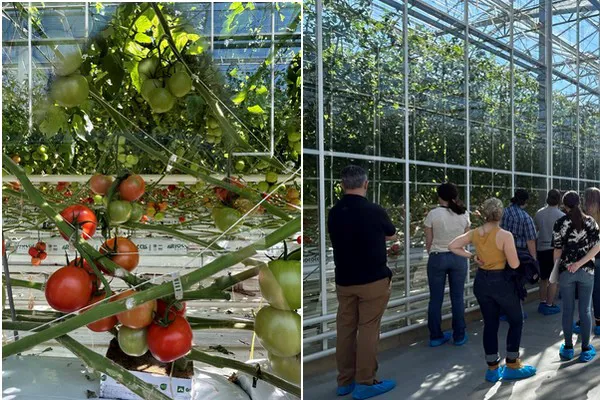US (WV): Virginia Western Community College awarded a National Science Foundation grant focused on agricultural technology
Virginia Western Community College received a $343,209 Advanced Technological Education (ATE) grant from the National Science Foundation, an independent US government agency.
The three-year grant will support the College’s project, “Cross-Pollination Skills: Developing Mechatronics and Agricultural Collaborations for Developing Agricultural Professionals,” which will test the ideas of West Virginia faculty members. improving professional education.
“We are very grateful to receive this great grant from the National Science Foundation,” said Dr. Robert Sandel, president of West Virginia. “Our faculty is always looking for new ways to equip our students to meet the needs of society, and this partnership strengthens that power. these employers.”
The Cross-Pollination Skillsets project is a priority for the national government to improve business opportunities through controlled environmental agriculture (CEA), according to Dr. David Berry, assistant professor and head of the Mechatronics Program. As principal investigator, Berry will lead the new initiative with Dr. Mallory White, assistant professor of biology and the Agriculture program, serves as a co-investigator. The idea of the grant is to train the next level of professionals needed in the government’s agricultural workforce.
Key to the creation of the project was collaboration with the project’s Business and Industry Leadership Team (BILT). Contributing as BILT members are: Matthew Lohr, Virginia Secretary of Agriculture; Arturo Gomez Mazatan, Red Sun Farms; J. Scott Lowman, Center for Advanced Education and Research; Gus Brennan, Greenswell Farmers; Jared Heffron, Novenesis; Stefanie Manbeck, Cattlemen’s Insurance Institute; Kate Stevens, James River High School – FFA advisor/agriculture teacher; and Walter Grigg, TORC Robotics.

“This project was created by our community partners, and we are very grateful for their support,” said Dean of STEM and Workforce Solutions Amy White. “Our faculty researchers were very open and flexible as we began the design process, so we were able to be very agile in responding to BILT’s proposal.”
Industry members outside of BILT also recognize the value of project partnerships. “Integrating agriculture and technology into a college education is important for businesses like MOVA Technologies Inc. or Vegg Inc., which provide climate-smart ag-tech solutions,” said Luke Allison, director of development and Communications of MOVA Technologies, Inc. The next generation of workers must be leaders in environmental care as they move forward with technological advances that need to ignite their imaginations, encouraging a dynamic approach to creating new solutions for other challenges. they will appear.
In collaboration with Shelley Lyons, Virginia Western’s grant coordinator, and Dean Amy White, researchers Berry and White began preparing the grant proposal with advice and technical support from Mentor-Connect, which provides resources of consulting and technical assistance to help two-year college faculty write competitively. give suggestions. Mentor-Connect is an ATE project led by Florence-Darlington Technical College in partnership with the American Association of Community Colleges. Virginia Western was one of 24 community colleges nationwide selected to participate in Mentor-Connect’s year of workshops and training to prepare a grant application.
“Most of the credit for our winning proposal must go to the Mentor-Connect program. At first I was skeptical that the program would work well with our area of expertise. The focus on agriculture is increasing and I I wasn’t sure there was a mentor who would have experience with that,” said Berry. we were full of other jobs. The result of this experience was not only the production of success; Our internal team, our external network and our focus have been strengthened. very much.”
Mallory White pointed out the need this project will fill. “This is a new area. However, our urban college is ready to teach the public about hydroponics and controlled environment farming,” he said. “We have a strong science department, so it’s important to take advantage of our existing programs, incorporate new courses, and think about the future to meet the growing demand for advanced farming techniques that are needed to ensure that more crops can be grown efficiently and sustainably.”
Students will be able to combine courses in Mechatronics and Agriculture, as well as new courses being developed, to obtain an Associate of Applied Science in Technical Studies. Because these programs already existed, there is a much easier way than the long process of having a new program approved at the national level.
The NSF grant will help staff, study development and resources to focus on managed-environment agriculture. For example, the project is developing a direct planting and hydroponics course, which will include equipment that will also benefit the College’s Horticulture Program. “We will be able to cross mechatronics and ag fields – mechatronics with sensors and pH meters, to give students more practice with data analysis and the ag field by understanding the technology behind hydroponics,” said Mallory White. The program also plans to benefit K-12 students.
Another way to cross-pollinate involves increasing gender diversity among the current Mechatronics and Agriculture workforce. The Mechatronics program enrolls the majority of male students, while female students comprise the majority of those enrolled in the Agriculture Program. “One of the outcomes we want is to create a diverse population in the programs and have men and women explore ideas within this growing field of controlled environment agriculture,” he said. Berry.
The ATE program focuses on the education of professionals working in the high-tech sectors that drive the country’s economy. Because two-year community and technical colleges are the primary sources of technical education in the United States, faculty from these institutions of higher learning have played leadership roles in many ATE projects since when the program started in 1993.
“We are excited to work within our community to support the growing agricultural sector and look forward to the results of this important project. We strive to be good community partners, and this project is another way. and that Virginia Western can be a leader in providing philanthropic opportunity and resources to our students,” said Dean Amy White.
Source: virginiawestern.edu
#Virginia #Western #Community #College #awarded #National #Science #Foundation #grant #focused #agricultural #technology